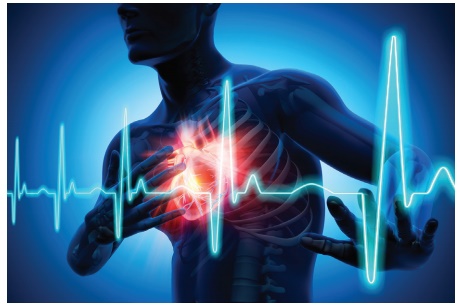Definition, Types, Causes, Signs, Symptoms, Diagnosis, Management, Complications - Myocardial Infarction (MI) | 12th Nursing : Chapter 2 : Medical Surgical and Applied Nursing Management Psychology of Human Diseases
Chapter: 12th Nursing : Chapter 2 : Medical Surgical and Applied Nursing Management Psychology of Human Diseases
Myocardial Infarction (MI)
Myocardial Infarction (MI)
A heart attack is a life-threatening condition that occurs when
blood flow to the heart muscle is abruptly cut off, causing tissue damage. This
is usually the result of a blockage in one or more of the coronary arteries. It
occurs as a result of sustained ischemia, causing irreversible myocardial cell
death (necrosis). 80% to 90% of all acute Myocardial Infarctions (MIs) are
secondary to thrombus formation. Acute myocardial infarction is the medical
name for a heart attack.
Definition
Myocardial infraction refers to a dynamic process by which one or
more regions of the heart experience a severe and prolonged decrease in oxygen
supply because of insufficient coronary blood flow, subsequently necrosis or
death to the myocardial tissue occurs.
Types
1. Non-ST segment elevation myocardial infarction or heart attack
(NSTEMI)
2. ST segment elevation myocardial infarction or heart attack
(STEMI).
Causes And Risk Factors
·
Bad cholesterol, Saturated fats, Trans fat - intake
·
Obesity - cause of 20% cases
·
Genetics
·
High Blood Pressure (hypertension)
·
High Triglyceride level
·
Diabetes and high blood sugar level
·
Smoking causes above 36% cases
·
Lack of exercise linked 7 to 12% cases
·
The use of certain illegal drugs including cocaine and
amphetamines
·
A history of preeclampsia or high Blood pressure during pregnancy
Signs and Symptoms
The classic symptoms of a heart attack are chest pain and
shortness of breath, the symptoms can be quite varied.

The most common symptoms of a heart attack include:
·
Prolonged cardiac pain (severe, sharp stabbing, radiating to neck,
shoulders and back)
·
Breathlessness
·
Collapse / Syncope / Fainting
·
Pallor
·
Hypotension (or) Hypertension
·
Disorientation
·
Sweating
·
Anxiety
·
Tachycardia
·
Nausea and Vomiting
Diagnosis
·
ECG (Electro Cardio Gram)
·
X-ray Chest.
·
Serum Cardiac Markers Blood tests such as Troponin and Creatine
KinaseMB (CK-MB).
·
Angiogram with coronary catheterization to look for areas of
blockage in the arteries.
·
Echocardiography
·
Coagulation Studies
·
Nuclear imaging
Medical Management
·
Made the patient in a comfortable bed and provide complete bed
rest
·
Administration of oxygen
·
Starting IV line
·
Monitoring ECG
·
Administration of analgesics (opiates)
·
Oral antianginal drug.
·
Thrombolytic therapy.
·
Anti-coagulants.
·
B-adrenergic receptor antagonist.
·
Anti-arrhythmic.
·
Antiplatelet.
Surgical Management
·
Percutaneous Transluminal Coronary Angioplasty (PTCA)
·
Coronary Artery Bypass Grafting (CABG)
Nursing Management
·
Vital Signs
·
Provide comfortable bed.
·
Oxygen administration
·
Start Intra Venous (IV) line
·
Intake and output chart
Complications
·
Thromboembolism
·
Dysrhythmias
·
Heart failure
·
Cardiogenic shock
·
Papillary muscle dysfunction leads to mitral regurgitation
·
Ventricular Aneurysm
·
Pericarditis
·
Acute Circulatory failure
Related Topics